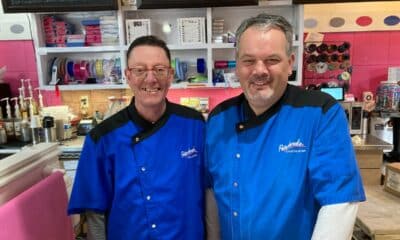Business
How to Position Your Small Business to Grow Sales During and After COVID-19 [Podcast]
Published
4 years agoon
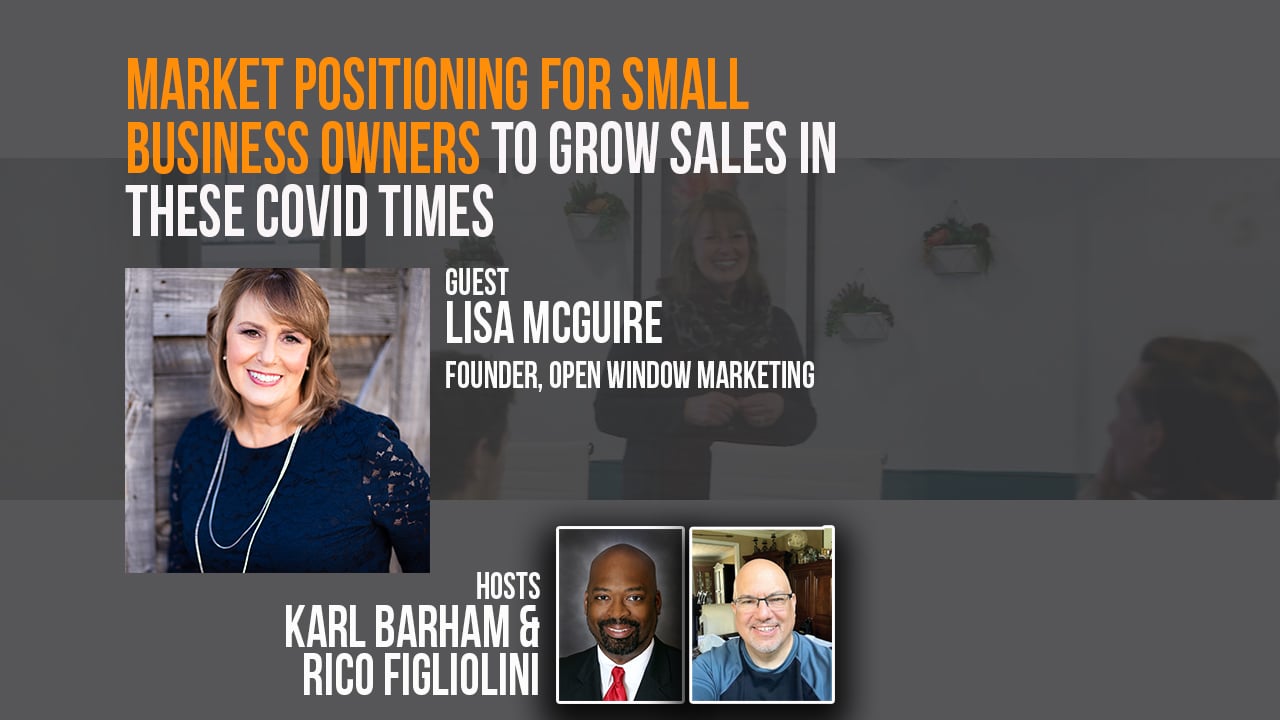
The pandemic has changed customers and their buying habits. That’s without question. So how do you talk to them now and in the next normal time? Open Window Marketing founder Lisa McGuire joins Karl Barham and Rico Figliolini to discuss brand positioning and more.
Social Media
LinkedIn
Instagram @iamlisamcguire
Marketing Tips for Small Business Owners to end 2020 strong.
- The 3 Customer Profiles of 2020 – how your customer has changed
Customers have shifted from pre-pandemic to the pandemic to the next normal. How can you possibly know what to say? - Why traditional marketing no longer works and how to move forward.
Traditional marketing talks about the features of the product and why they are the best choice. In our noisy world, you need a new approach. - Why your personal brand is even more important to help you drive more revenue
Timestamp, where to find it in the podcast:
[00:00:30] – Intro
[00:03:10] – About Lisa
[00:04:01] – Marketing Mistakes
[00:05:43] – Changing Clientele
[00:09:33] – Importance of an Online Presence
[00:16:14] – Clarifying Your Message
[00:21:14] – Traditional Marketing
[00:23:57] – Spending and Personal Branding
[00:30:17] – Marketing Done Correctly
[00:31:52] – Closing
“And the big idea to take away from this is the customers that you’ve had no longer exist.
Lisa Mcguire
They are now pandemic customers. They have new problems, they have new priorities. So what
do you need to do in your business to shift your product line and offerings? To meet these new
problems, or if you still connect with their problem, how do you need to shift your message?”
Karl: [00:00:30] Welcome to the Capitalist Sage Podcast. We’re here to bring you advice and
tips from seasoned pros and experts to help you improve your business. I’m Karl Barham with
Transworld Business Advisors, and my cohost is Rico Figliolini with Mighty Rockets Digital
Marketing and the publisher of Peachtree Corners Magazine. Hey Rico, how are you doing?
Rico: [00:00:47] Good Karl. It’s a beautiful day considering how much rain we had the other day.
Karl: [00:00:53] I know, I know. This storm has gone past and now we’ll hopefully get some
better days going ahead. Things are getting cooler for the fall. Why don’t you introduce our
Sponsors?
Rico: [00:01:04] Yes. Our lead sponsor is Hargray Fiber. Hargray Fiber is a Southeast based
company that does internet connectivity. They handle fiber optics, which is the main drive of any
internet home or office, right? So they’re in the communities that they serve as well. So they’re
not your cable guy, right? They’re not a company that just has an office there. They’re involved
in the communities that they’re in, whether they’re involved with local companies. So for
example, in Peachtree Corners, they’re involved with Curiosity Lab at Peachtree Corners with
the city. They’re providing internet connectivity to a lot of companies in the area. So if you are
interested in Fiber optics in a company that’s local that has a local presence, and that can give
you the tools you need, like smart office tools to be able to operate your employees at home or
in the office, reach out to HargrayFiber.com or you could go to Hargray.com/Business. And they
have a promotion going on, a thousand dollars visa gift card for those companies that qualify
becoming a client of theirs, so check them out.
Karl: [00:02:10] Oh, that’s fabulous. Everyone needs more internet, more speed and I’m glad to
have good businesses like Hargray in our community to help business owners with that. Today,
I am honored and pleased to have a great guest. In this fourth quarter as we’re coming in,
rounding out 2020, most business owners have seen all sorts of impacts. Some have grown,
some have stayed the same. Some have actually seen some reduction in their customer. What I
know for sure if you’re going to have a great fourth quarter and start off 2021 well, you’ve got to
focus on growth. And today we have Lisa McGuire here to talk about how small business
owners can really focus their marketing and sales efforts in concert. To help them really have a
springboard to their growth in 2020 through 2021. Hi Lisa, how’re you doing today?
Lisa: [00:03:07] I’m doing great Karl. Thank you so much for having me.
Karl: [00:03:10] Oh, pleasure. Well, Lisa McGuire is a business growth and adviser. And a
marketing consultant with Open Window Marketing. And I’d love for her to introduce herself and
tell a little bit of how she helps people in business.
Lisa: [00:03:25] So, one thing we know is when business owners started their business, they
wanted to do the work they love. They didn’t necessarily want to wear all the hats that a
business owner has to wear when running a business. So what I do is I come in and help them
determine how to figure out who their ideal client is, how do they connect with that client, what
message does that client need to hear, to be able to engage with them, and then how to grow
their business through marketing that works. And then it filters into the other areas, productivity,
the mission of their company, the culture of their workforce too.
Karl: [00:04:01] Wow. Well, I’ll tell you, I look at a lot of P&Ls for business owners. And one of
the things that really becomes apparent, I look at how one business owner spends on marketing
and ask some questions about that. And then I look at another one who may not do a lot of
marketing. You’ll hear a lot of, I grew my business through referrals and so on. And I realized
there’s a big difference when you look at the performance of growth, those that focus on that
marketing versus those that don’t. But when they start business, they didn’t really think about
that. What are some of those mistakes you see business owners making when it comes to
marketing their business in general?
Lisa: [00:04:45] Yeah, just kinda marketing their business in general. What they’re looking at,
they’re looking at, okay, what is it that I have to sell and how can I push it out to get as many
people to buy it as possible? They’re not looking at it from the customer perspective of what do
they need to hear. All they know is I’ve got this many widgets to sell, or I’ve got to book this
many billable hours, and what can I do to make people buy from me. And so what they end up
doing is they’ve got this message they repeat over and over that isn’t connecting with their
clients. They put a lot of money into tactical things. They’ll do Facebook ads, they’ll pay a lot of
money for SEO to get people to come to their website. But what happens is the message that
they’re using either to get people there, or once they are on the site, it’s not converting because
it doesn’t matter to the customer. They talk about features. They forget about them.
Karl: [00:05:43] Wow. Well this year, has gotta be really interesting. For many businesses
because of the pandemic, their customers might have change. Either new customers are
coming through or what their existing customer needs have changed. How would you walk
someone through looking at a situation like that?
Lisa: [00:06:04] Yes, this has been a year that was unthinkable. We never could have imagined
it. And so if you think about back to January, February, we had pre-pandemic customers. Things
for going along, if you remember just a couple months before that we were celebrating a new
decade, there were all kinds of analogies, the 2020 vision, we’re going to make this the decade
that really makes the difference. And then the unthinkable happens. We have this global
pandemic. And really the whole world, as far as the business world in the United States, just
kind of came to a standstill. You know, we were in a period, if you remember back think when
they said, if you just quarantine for a couple of weeks, we’ll get through this. And so it was
uncharted territory. So here’s what we found with businesses. They did one of three things.
They either continued with their marketing as usual. They used a different message and pivoted
their message. Or they said nothing at all. So if we look at those three things, continuing
marketing business as usual would tell their customers you’re insensitive to what’s happening in
my life. Why are you going on acting like this world has not changed? The ones that went quiet,
what happened is they made a space for other businesses to come in and take their place. But
the businesses that won, the businesses that did well, were businesses who first of all
acknowledged what was happening and became very empathetic to your customers. You know,
there was and continues to be, but initially a lot of fear. A lot of anxiety, anxious, you know,
what’s going to happen to my business? What’s happening with my family? Am I in danger with
my health? So making sure that you really understand that customer and who they are was
really critical. So we heard a lot of messages, we’re in this together. You know, we’ve heard the
new normal, we heard all of those things to really unify our market place to be able to reach
them. But now we’re what, six months into the seven months into this, I guess, because it’s six.
Now you’ve got a third type of customer. You’ve got the customer that is realizing, okay, this is
our new way of life for now. You know we’re moving forward, so what can we do? Our whole
world has been disrupted. If you think about it or work lives, our home lives, how we consume
media, how we purchase, what we value up, like everything has been shifted. So what can we
look at what the customers, what they need now? And what the big idea to take away from this
is, the customers that you’ve had no longer exist. They are now pandemic customers. They
have new problems, they have new priorities. So what do you need to do in your business to
shift your product line and offerings? To meet these new problems, or if you still connect with
their problem, how do you need to shift your message? And that is the advice I would give
business owners heading into 2021. If you’re using a pre pandemic message, you’re talking to a
client who is no longer existing.
Rico: [00:09:33] Lisa, do you, what do you find from the clients that you talk to from the
companies you talked to more effective? You know, as far as business goes, what tools are
they implementing? What are they changing that they weren’t doing before the pandemic?
Lisa: [00:09:51] Well, I think the thing that has become very apparent to business owners is if
you did not have an online presence, you need to have one. You know, I’m very active in
networking and in those first couple of weeks, people were trying to figure out how do we
network if we can’t go to coffee? How we will reach people? How are people going to find me?
And you know, if you look even at restaurants, they had to do a quick of it. How do we get
people to consume our food? How do we make them feel like they’re safe? So being online and
making sure that your customer experience online is seamless. That has been the big shift that
I’ve seen with most people is figuring out, okay, how do I go online and switch my products.
Rico: [00:10:38] You know, what’s interesting. I think in the restaurant business especially, it
was easier, right? Because you had Yelp, you had Door Dash, you had Grub Hub, you had all
these businesses. If you wanted food, you could, you would go out and you’d find it. You know,
where you could go. The problem is with, you know, with a place like a yoga place or a soap
maker type of store, it’s difficult, right? Because people aren’t quite looking for that and they may
want it, but they just don’t know. So there’s that two-sided edge to that right? You do, but I agree
with you. You have to be online, but it’s way more difficult for some businesses than others.
Lisa: [00:11:17] Yes, it definitely is. So we saw a lot of people in the health and fitness space go
online and start having virtual yoga classes, things such as that. We found brick and mortar
stores suddenly had to have an eCommerce site. But the other thing too, we have this
opportunity of where we may have been marketing within a geographical area, is now we could
extend our services, you know, you can network nationally or internationally. I’m working with a
couple of clients who did work with local Atlanta businesses or local Atlanta clients. And now
their clients are all across the United States. So how do they find them? How do they reach
them? How do they connect with them?
Karl: [00:12:01] It’s easy to understand the power of being online. And I visit businesses and I
look at their websites all the time and it’s a pandemic in itself how bad some of these websites
are. People don’t put a lot of attention. When you look at a website, someone doing it right, what
are some of the things? Maybe not technical, but what are some of the things that you find helps
business owners be more reachable and successful online?
Lisa: [00:12:33] Yeah. So the first thing, you know, as we talk about websites, Karl the thing I
would invite people to do is if you think you have a great website, look at two or three of your
competitors and go to their websites. And what you’re going to find, it’s very likely you’re all
saying the same thing. So what you have to do is figure out how am I going to stand out?
There’s a couple of different ways to do that. So the immediate piece of advice I can give all
your listeners today, you can go and do this and start making money tomorrow. Make sure you
have clear call to action buttons. And you want them all over your homepage. So you want one
in the upper right hand corner. In that hero shot area. You want one in the middle of that hero
shot area and make sure those call to action buttons are a different color than the rest of your
website. Make sure they’re the same color throughout as you cascade down the page. As you
scroll down the page make sure there’s always a call to action button in the screen as well as in
the upper right hand corner. Because here’s what happens, the visitor may not be ready to
purchase from you or maybe ready to take the next step with you initially, but as they scroll
down the page and start learning more about you, Oh, now I want to know more. And so you
want to make it convenient. We call that call to action button, your cash register. So why would
you hide your cash register in the back ladies room? You want to make sure they’re all over the
place, right? So that’s something you can do to start making money today. So that’s one thing, if
that’s helpful to you.
Karl: [00:14:13] Yeah, that’s great advice. The other thing is, there’s this thinking around Google
pay-per-clicks and Facebook ads and so on. How do they, how do business owners use those
to integrate with their website?
Lisa: [00:14:28] Yeah. So there certainly is a place for paid ads. And you know, the thing is, is
you start with your website. You want to make sure that Google recognizes your website as a
quality website. So I’m going to answer your question, Karl, but I’m going to kind of connect
these two. First of all, Google’s going to try and watch and monitor to see, are people when
they’re on your website, are they staying on it long? If they can register that they’re staying on it
long, that signals to Google, there is quality content on there. So again, your message is so
important. So when you go to a website, you should be able to immediately know what the
business does. It is astounding, the number of business websites I see, I can’t tell what they do.
I have to know what you sell. What do you do for me? Making sure that you are updating
content. And so that would be having a blog on your website, talking about topics that people
have questions about. And, you know, people say, I don’t know what to write in a blog. Think
about this, what are the top five questions people ask you about your business? Those will be
your first five blog topics. And so putting those on there, that’s going to give you some organic
reach with SEO in that. But then when you get to ads, paid ads, that’s when you can drive
people to your website whether it’s Facebook ads or Google ads. And I recommend not trying to
do it yourself, work with a digital marketing specialist who knows what they’re doing. I believe in
paying experts for what they know so well.
Karl: [00:16:14] There’s a subset of business owners that I know struggle in this space. And it’s
in the professional services. Lawyers, accountants, etc. Very smart, very talented in their
profession. But when it comes to marketing themselves, maybe not as strong. And their content
can be confusing to the layman. Finding the intricacies of tax law for how to get out of speeding
tickets or whatever that might be. For those types of businesses, how can their messaging on
their website help them? What would be something they can do to guide people in?
Lisa: [00:16:54] Yeah, so a really great way to do that because, you know, here’s the thing we
want those experts. And when you need someone like that, you want someone who knows what
they’re doing, who knows all the intricacies and you know, the ins and outs of how to practice
their profession very well. But what happens is when you speak with them, because they are so
educated and they’re so good at what they do. You’ll find a lot of times they tend to use what we
call insider language. So they’ll use industry terms. And when they start using those, the person
reading the website or the person listening to the message, what goes on in their mind is they
say, I don’t know what that means. So they either get stuck trying to figure it out, what are they
talking about? Or they just stopped listening because it’s too much work to try and keep up with
the person communicating the message. So that is one thing I would advise for those folks, is to
stop using insider language. To make your language, make your website as if a 10 year old
could read it and understand it. You want the language to be that simple. You’ll be able to bring
in your credibility and authority the longer people stay on your website, but that would be the
first thing I would suggest. The second thing I would suggest is make sure that you really get to
the problem that your customer has. And here’s the thing, traditional marketing was talking
about the business. Today, great marketing is being known for the problem that you solve. So I’ll
use a tire store for an example. This one I use quite frequently. So if I sell tires, I am not selling
tires. That’s not the problem I solve when somebody needs tires. The problem I’m solving is
someone needs to have a vehicle that is safe on the road because they have quality tires. The
problem I’m solving is someone has to turn in their car for a lease and they’ve got to update their
tires so it meets qualifications. So look at for the customer, what is that pain they are
experiencing? How is it making them feel? And being known for solving that problem, that is the
way that you go in as a professional service provider and speak to them.
Karl: [00:19:20] It’s interesting, as you’re saying that, it made me think of this concept around
demand generation and leading the customer to discover or clarify the problem they have and if
you’re the person that helps them do that. And a lot of professional services, I talked to
someone the other day, a client the other day, and they were concerned about, they took out
PPP loans and EIDL loans this year. And so as they’re going through, I mentioned to them, they
have to process or apply for forgiveness. They looked at me kind of shocked. You mean it
doesn’t happen automatically? And so I know lots of financial advisors and CPAs and
accountants and folks that help in that area. No one’s talking about that problem that’s out there
that people may not know. And is that an example of some blog and/or content around that
particular problem that would help someone find a professional service site?
Lisa: [00:20:25] That is a very timely and perfect example, Karl. Because, so these people
walked into these situations, you know, okay, this is great. You’re telling me I can get this
money. How does this work? They were very good about leading them to it, but now is the next
step of now you’ve got to apply for forgiveness. Well, these people don’t know how to do it.
What does that look like? How do I? Is there a way I could do it and mess it up? Please help me
figure that out. So that is the next step of when the bank says okay, now it’s time, wherever you
were able to secure. It says, okay, now it’s time to start moving it along. We have no idea of
what that means. So you’ve got to spell that out as well. Yeah. Great example.
Karl: [00:21:14] Well, if I can ask a little about some of the more traditional forms of marketing.
This year, I don’t know how many movies were released between March and September, but no
one’s watching ads between movies anymore. What did the role of these other different
vehicles, whether it’s ads and papers and magazines and those types of direct marketing. What
role does that play in marketing today? And should people still be investing in those?
Lisa: [00:21:47] So, yes, there’s a lot of different types of marketing. And that’s the thing when
you talk to someone that has a marketing company that can mean a dozen different things, a
dozen different directions. And people are always looking for quick fixes, but I really, you know,
the way I describe marketing is imagine you were going on a cross country trip, you know, you
know, your goal is to get the other side of the country. You would not think of getting in your car
and just starting to drive without putting gas in the tank and making sure you have snacks. You
might, you know, plug in your GPS where you’re going, or, you know, you’ve got your Google
maps, you make a plan. You don’t just start getting, you don’t get in your car and just start
driving wherever you want. Well, that’s what people do with their marketing. So, okay I need to
market. Maybe I’ll try direct mail. Oh no, no, we don’t do direct mail because you know, I don’t
use direct mail. So why would anybody else use that? But even here’s a really great rate or
maybe I’ll try these Facebook ads and I’ll boost the post myself. Well, maybe so they’re all over
the place. So the first thing I would recommend for any business owner is to just sit down with
someone who knows what they’re talking about in marketing and develop a strategy. You know,
come up with a 12 month plan, a six month plan, a three month plan. Allocate some budget to it
because your business will grow in one of two ways. Your business is either going to grow by
innovating. So that’s changing up, pivoting, doing something better. Or it’s going to grow by
marketing. So you’ve got to make that investment one way or the other. And when you start
seeing traction, that’s when you’ll have, you know, more to be able to boost from. But you’re not
going to have that traction. You’re going to be wasting your money if you start going into
different areas that don’t apply to you. And I think what happens a lot of business owners,
they’ve got their buddy that did this, or they know of this other company, their competitors doing
this. They think they need to do it too. And that’s probably the worst thing they can do.
Karl: [00:23:57] I’ll offer up, if I could add to that, for business owners out there. There’s three
numbers I’ll share, 4, 8 and 12%. When I look at a P&L for a business and I’m looking at trend
over time, I notice how much percentage of their revenue to spending on marketing and I look at
their growth rate. And what’s often, if you want to benchmark for mature business, that’s been
around and known for a while. Some of those can get away with between 4 to 8% spend on
marketing. If they want to grow. If they want to stay flat. They don’t have to spend on marketing,
but if they want to grow their top line revenue, 4 to 8% is what your competitors, what other
people are spending normally grow. If you’re a new business or you’re a business that needs
some explaining or new to an area you’re talking about 8 to 12%, range depending. If your
product is known, but you’re a new company offering something that’s known, you might be
able to get away with 8%. If you’re offering something new and no one else is offering it and you
want them to build awareness. You’re talking close to 12%. I offer those numbers because it is
extremely consistent looking at the spend on marketing correlating to how people grow their
business. Now, the ones you’ll always have a family friend that says I spend nothing on
marketing and my business keeps growing. That is the anomalies. They’re innovating, they’re
doing something different, or there’s something that’s giving them a competitive advantage. Or
they are marketing without spending. So talking about personal branding, talking about other
ways to gain audience without spending for it. Can you comment a little bit on that?
Lisa: [00:25:48] Yes, sure. This is one thing that as we have been in this situation, we’re seeing
a lot more people on LinkedIn. I don’t know if you’re active on LinkedIn or not, but we’re seeing
a lot more of that. And there’s a lot of people that don’t know how to use LinkedIn and how they
can really leverage it. So, you know, here’s the thing that I tell people, particularly when you’re in
an industry that there’s a lot of other people that do what you do. People don’t want to do
business with business. They want to do business with people. And so what makes your
business different from every other business out there is you. And so being able to feature your
zone of genius, being able to show your authority, your expertise, your credibility. One way to do
that is to really work through a personal branding process. Now, personal branding is not all
about saying, Hey, look at me. It’s not about becoming an Instagram influencer. It’s not about
being any of those. It’s really being very strategic about understanding. How do you show up
online? Is that how you want to show up online? What do you need to do to shift that if it’s not
where you want it to be and how can you position yourself as a credible expert that people
would trust to do business with you? So that is something that I really encourage people to do.
Whether you work for a company or whether you own your own business. The only thing you
own when you leave your business is your personal brand. So it’s well worth the investment to
spend the time to do that.
Karl: [00:27:19] I love that you mentioned that. I’m curious about your thoughts on integrating
your personal brand or your personas, if you want to call it, professionally and personally.
LinkedIn, Facebook, Instagram, Twitter, all of these, Tic Tok. They have different use cases for
different application. But I’ve seen more people, especially in 2020, there’s a lot of issues out
there that people are commenting on. Whether it’s social justice or gender or race or other
political items, things about climate change, and others. People are voicing their opinions across
spectrums that’s interweaved with their expertise in their business. Any thoughts on how to
manage that. And is that a good idea or? Well, what do you, what would you advise people to
do with that?
Lisa: [00:28:13] You know, it’s what I advise business owners is what I’ve always told my
children. Anything that you’ve put out there online will follow you and could be found. And if it’s
something that you aren’t willing to put on a billboard and have your grandmothers see, then
don’t put out there. If it’s not something that you’re not willing to share in your next job interview,
don’t put it out there. There are filters, but still there are way to, you know, there are ways to get
through those. And you just always have to be conscious of whatever you are putting out there
represents who you are, and it does follow you. So there are appropriate channels. And then
there are ones that maybe you need to just have a conversation with a friend.
Karl: [00:29:00] I’m curious about, there’s a professional sphere, but there’s all these businesses
that are coming up in this entertainment mixed with business. So you could take the example of
a local ice cream shop or fitness business, where it is a business and they have customers, but
it’s also a culture and a group and a community that they’re building that reflect certain beliefs
and their personal. How can those types of businesses leverage both social media and how
they brand themselves?
Lisa: [00:29:35] Right. So it’s a great opportunity and I don’t want to, you know, imply that you
always have to stay buttoned up. I think you have to really look at who is your ideal client. Who
are you trying to attract? If you are on LinkedIn, you’re trying to attract a different crowd than
what you’ll probably find on Instagram, or Pinterest, or Tic Tok, or Facebook. Those all have a
different feel to it and different clientele. So if you are an ice cream shop and you’ve got music
going on, you’ve got certain culture or whatever, they’re trying to attract the audience. They
need to be who they are. They need to be authentic. They need to be transparent. But they also
need to be respectful of their audience.
Karl: [00:30:17] I’m also curious, just comment and maybe Rico as well. When you interact with
people online in a lot of your publications, in your content out there, have you found examples of
people doing it really well? Can you give us an example where you saw people blend those
different personas well online?
Lisa: [00:30:42] I can’t think of one person that comes to mind right now, but here’s what I see
as a trend. It’s people who are sharing their expertise. They’re generous and they’re humble. So
they’re out there, they’re being servant leaders. They understand what their customers need.
They’re very generous with it because they believe in the law of reciprocity. You know, if I give
to you and I’m giving freely, and it’s this valuable, imagine what you’re going to get if you pay to
work with me. I mean, that’s the message that they’re sending. So I think that is a great lesson
for all of us, is we are here to serve in our businesses. We’re here to serve our clients and one
way to attract clients is to let them see what you’re about. Let them experience you before they
pay you anything. I think that would be a good model to follow.
Karl: [00:31:41] That would probably be about 1% of politicians by my guess.
Lisa: [00:31:45] Yes. They don’t fall into that trend very easily.
Karl: [00:31:52] That’s fabulous advice. Well, I’d like to, if folks wanted to get in touch with you
and learn more about just marketing and ways that they could improve for themselves, what are
some ways folks can get in touch with you?
Lisa: [00:32:06] Yeah, absolutely. So I am on LinkedIn. It’s Lisa McGuire. I’m also
Lisa@LisaMcGuire.com. And they can also call 678-520-7660.
Karl: [00:32:26] Well, as we’re getting into fall and you’re starting to get busy with helping clients
grow. Are there anything you have coming up or what do you have coming up over the next
quarter? What are your plans?
Lisa: [00:32:36] Yeah, so I’m really excited. I am a StoryBrand certified guide, so I’m affiliated
with the StoryBrand company and they have a sector of their business called Business Made
Simple, BusinessMadeSimple.com. And so, it is a series of online courses. They really propose
it’s the same thing as an MBA only we’re going to save you $50,000 from that MBA. It’s a one
year subscription or when you’re licensed for $275. And they have courses on creating your
mission, marketing message, productivity, communication, scaling your business. So I am being
certified as one of their Business Made Simple coaches. So right now I’m in the process of
clients, coaching clients, or really business growth advising is what I do. I think there’s a lot of
coaches out there. And a lot of coaches end up being cheerleaders. This is not the case. I really
believe on providing frameworks and valuable tools that we can help make a difference in your
business grow. Whether it’s in revenue, whether it’s in culture, whether it’s just the business
owner growing as a business leader and becoming more proficient in what they do.
Karl: [00:33:50] Oh, that’s fabulous. As you mentioned when we started, a lot of people get into
business to do what they love and that’s their operational expertise and they started making
money there. I think the lesson is to transform or to grow into becoming a true sustainable
long-lasting business, you’ve got to evolve. And so the other pieces in the tool belt that you’ve
got to build is some financial smarts, some marketing smarts, how to recruit people, some HR
smart to really become a fully well-rounded business leader. And if there’s a way for them to get
it without spending $50,000 and taking a year or two off to get an MBA. I think that’s a good ROI
on investment. So thank you for sharing that.
Lisa: [00:34:36] Absolutely, yeah. Thank you so much.
Karl: [00:34:41] I want to thank Lisa McGuire, who is a business growth advisor and a marketing
consultant with Open Window Marketing. Thank you for your insights for sharing your
experience and to help every business owner figuring out little nuggets of things they can do to
improve their business. I’m Karl Barham with Transworld Business Advisors of Atlanta
Peachtree, and we are going to continue to help business owners post this shutdown period of
the pandemic. Figure out their best way to grow their business, improve. We can do that by
helping them to franchise their business. We can do that by helping them to acquire their
business. And for those that are ready to relax on a beach somewhere, we can help them find a
buyer and help them get their business sold. So you can reach me at KBarham@TWorld.com
or you can visit us on our website at www.TWorld.com/AtlantaPeachtree. Hey Rico, why don’t
you tell us what you’ve got coming up.
Rico: [00:35:39] Sure. First, I want to tell people that I totally enjoy talking to Karl off-camera
because I learn a lot from Karl, okay? I own my own business or businesses and, invaluable
insight from Karl and along with our other guests. I mean, Lisa has some good, great, valuable
insight here. And you know, we’ve done what, 40 of these?
Karl: [00:36:00] We’re up to 47. We’re going to hit 50 soon.
Rico: [00:36:06] There’s a ton of sage advice out there that we’ve learned. So I’m always happy
to be on a show like this, where we get more because I’m constantly learning. I own my own
business marketing, MightyRockets.com and everyone that watches this show knows that. We
publish Peachtree Corners Magazine which is coming out again every six weeks we sort of wrap
ourselves around the next issue and we put this out six times a year. So the next issue is
coming out around the first week of October. And we’re going to have great backyard retreats.
We’re profiling five local backyards that we feel are exceptional for a variety of reasons. So
we’re doing that. We’re doing a pets and their people give away, and that’s going to be a pull out
in the next issue as well. And we’re going to have probably get 4 or 5,000 pictures of people and
their pets that have been submitting. So we have this contest going right now. So if you haven’t
entered, go to our Facebook page or to our website, enter it. All you have to do is submit a
picture of you and your pet. And, you know, tell us a little bit about you all. And then we’re going
to pick three winners at the end of that. So we’re doing that. We’re doing a bunch of other
stories within that publication. It’s going to be chock-full things as it usually is. And you know, I’m
still working with clients as well, doing some of their marketing online content and stuff. So if you
need to reach me and you want to be able to do some of that work and you need someone to
do it, MightyRockets.com is the place to go. LivingInPeachtreeCorners.com is the place to find
the magazine and our family of podcasts. And I just launched the CapitalistSage.com website
just to begin exhibits. So it’s shallow on content right now. We’re adding all the podcasts that
we’re doing, that we’ve done. So you’ll find some of that there. We’re going to be adding over
the next few weeks. So check that out, leave your name and email address. And certainly you’ll
be reached back out to it again.
Karl: [00:38:09] And if I can, I want to spark an idea in honor of the theme of today, marketing. I
think you’re still accepting ads. If somebody would like to do ads for the magazine, you can
reach out for that? So for people in Peachtree Corners surrounding area, if you want to increase
your visibility, traditional marketing methods also still work. But you can reach out to Lisa to help
you with your messaging and Rico, if you’d like to have an ad added.
Rico: [00:38:38] So if you do, our deadline is, well our deadline is September 22nd for the print
magazine for the October, November issue. But you know, we come out six times a year. Plus, I
mean, it’s not just print. You get exposure in a variety of places, you know, online on our
Facebook page on Instagram, on Twitter, on LinkedIn. So if you’re an advertiser with us and
you have that type of package, we’re providing some of that online as well.
Karl: [00:39:05] So if you didn’t get the message, post pandemic, your customers have changed.
You need to talk to them. So take advantage. Thank you everybody for joining us today on the
Capitalist Sage podcast, you’ll find us on all of your streaming channels. iTunes, Spreaker,
iHeartRadio, on YouTube, on Facebook. Just go and explore Capitalist Sage. And, you know,
pick up something, apply it, and we’ll be happy to continue to give you great episodes. Thank
you.
Related
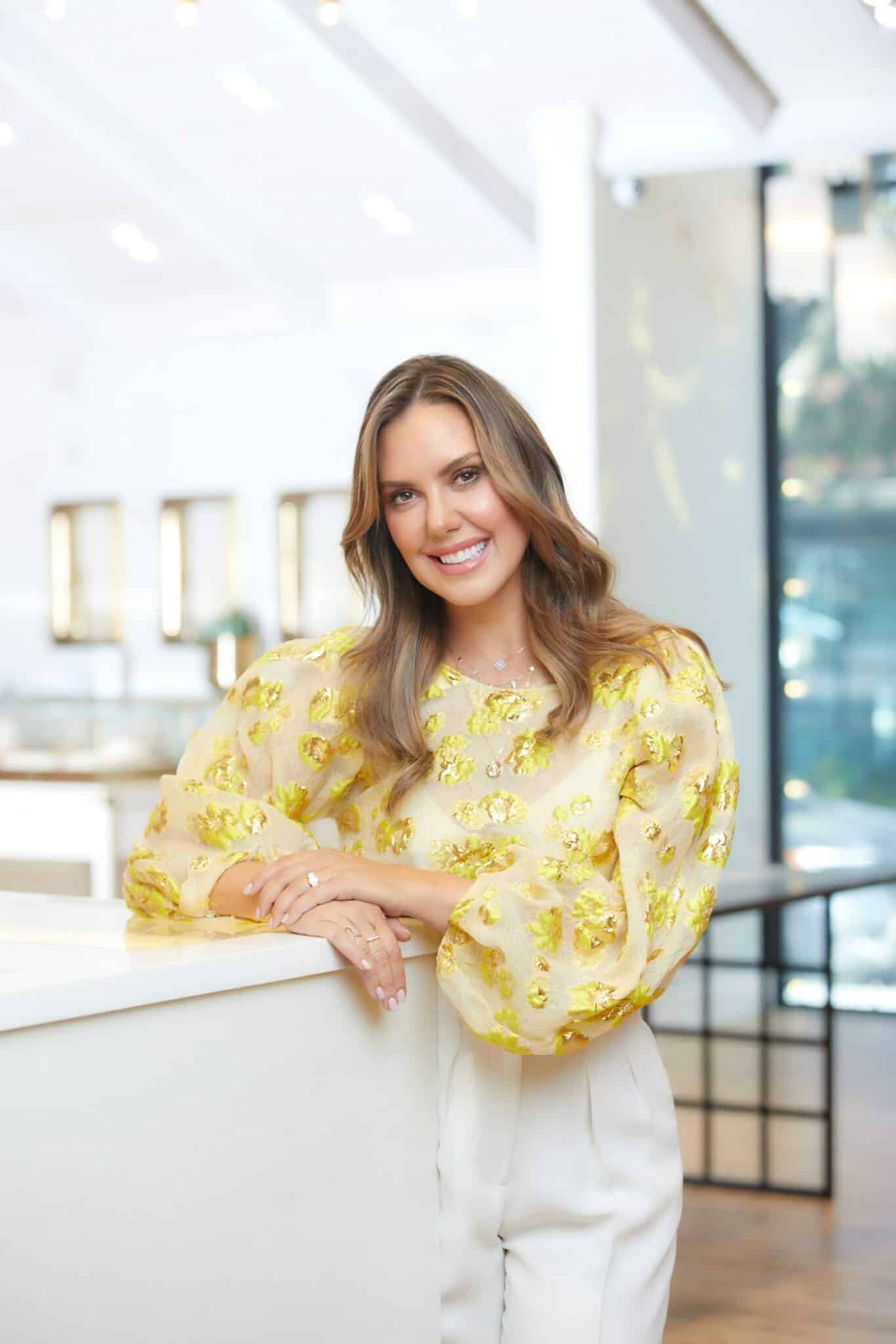
Kendra Scott is celebrating the opening of its newest store in Peachtree Corners the weekend of May 10 at The Forum.
Upon opening, the 2,263 square foot store will display Kendra Scott’s current collections. The store will also showcase the brand’s unique Color Bar, offering shoppers an interactive experience to create customized jewelry in minutes and leave with it in hand.
Worn by celebrities including Hailey Bieber, Camila Cabello, Mindy Kaling, Zendaya and Kelly Clarkson, Kendra Scott’s collections are known for their custom-created stone shapes, genuine materials and design details.
This will be Kendra Scott’s first store in Gwinnett County, which joins five other retail locations in Georgia.

The brand will continue to show its support for the community through partnerships with non-profits and local businesses. For the grand opening weekend, Kendra Scott Peachtree Corners will host various non-profits for Kendra Gives Back events, donating a percentage of proceeds directly back to the causes.
Kendra Scott hosts more than 10,000 Kendra Gives Back events in retail stores annually and looks forward to establishing relationships and connecting with the Gwinnett County community.
“We’re excited to continue introducing the community to new brands, bites and events at The Forum as part of our vision to create downtown Peachtree Corners. Kendra Scott will be a welcome addition, providing our guests a top-notch experience to shop its unique offerings in person,” said Charlotte Hinton, The Forum marketing manager.
Doors will open on Friday, May 10, at 10 a.m. with celebrations throughout the weekend, including giveback events, gifts with purchase and giveaways. RSVP for more details here.
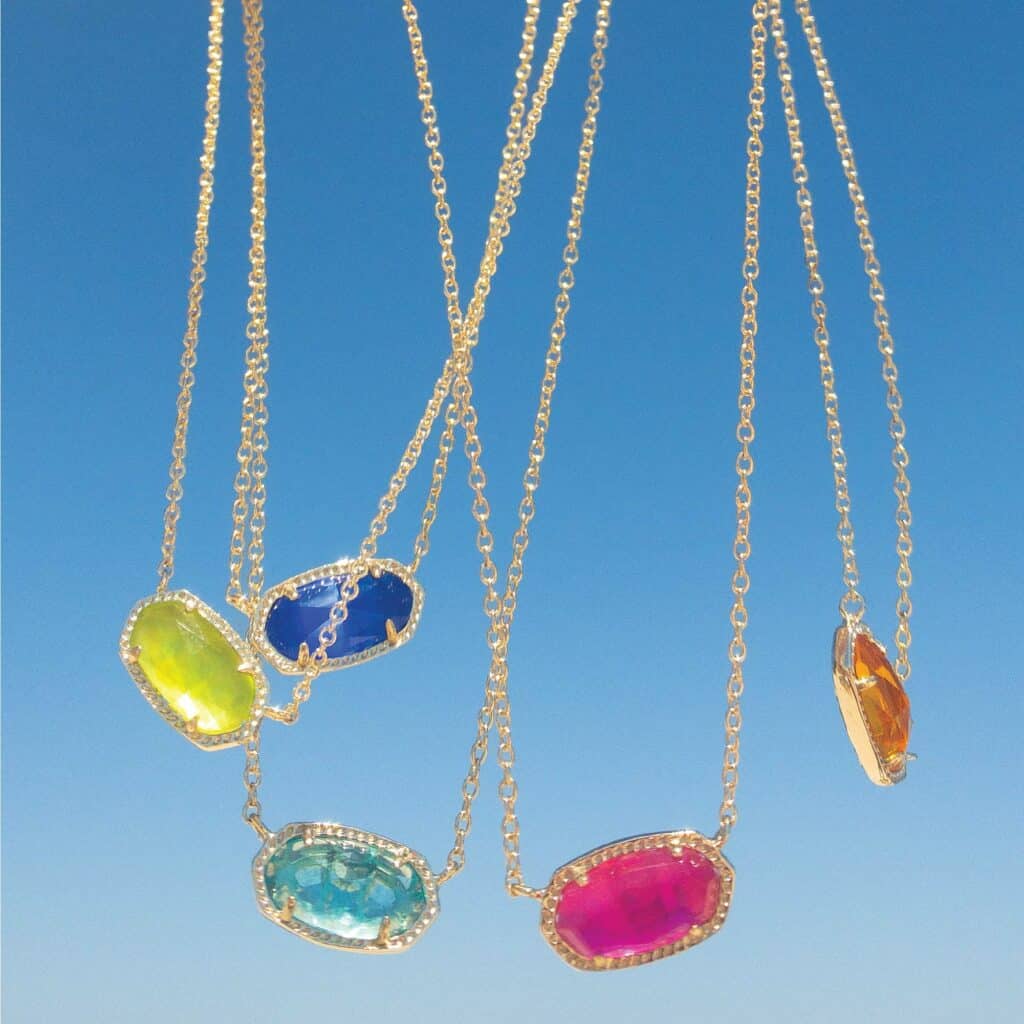
Upcoming events:
- Friday, May 10 from 10-12 p.m. – Kendra Scott Peachtree Corners is partnering with The Forum for a VIP event. Supporters who spend $100 will receive a special jewelry gift with purchase.* Guests will also enjoy refreshments from Giulia, The Italian Bakery.
- Friday, May 10 from 5-7 p.m. – Kendra Scott Peachtree Corners is partnering with the Norcross High School Cheer Team and donating 20% of proceeds. Supporters who spend $100 will receive a special gift with purchase* Guests can also receive a custom embroidered bow from Quiet Hours Embroidery with purchase.
- Saturday, May 11 from 4-6 p.m. – Kendra Scott Peachtree Corners is partnering with Spectrum Autism Support Group and donating 20% of proceeds. Supporters who spend $100 will receive a special gift with purchase.* Guests will also enjoy complimentary cotton candy from Wonder Soirée with every purchase.
- Sunday, May 12 from 12-2 p.m. – Kendra Scott Peachtree Corners is celebrating the Community of Motherhood. Supporters who spend $100 will receive a special gift with purchase.* Guests will also receive a complimentary Mother’s Day bouquet of flowers from Nancy’s Flower Truck.
*One per person while supplies last.
Kendra Scott Peachtree Corners is located at 5155 Peachtree Parkway, Suite 710 in Peachtree Corners at The Forum. For companywide updates and product details, follow @kendrascott on Facebook, Twitter, and Instagram.
Related
Business
BRACK: Peachtree Corners to lose Peterbrooke Chocolatier
Published
1 week agoon
April 19, 2024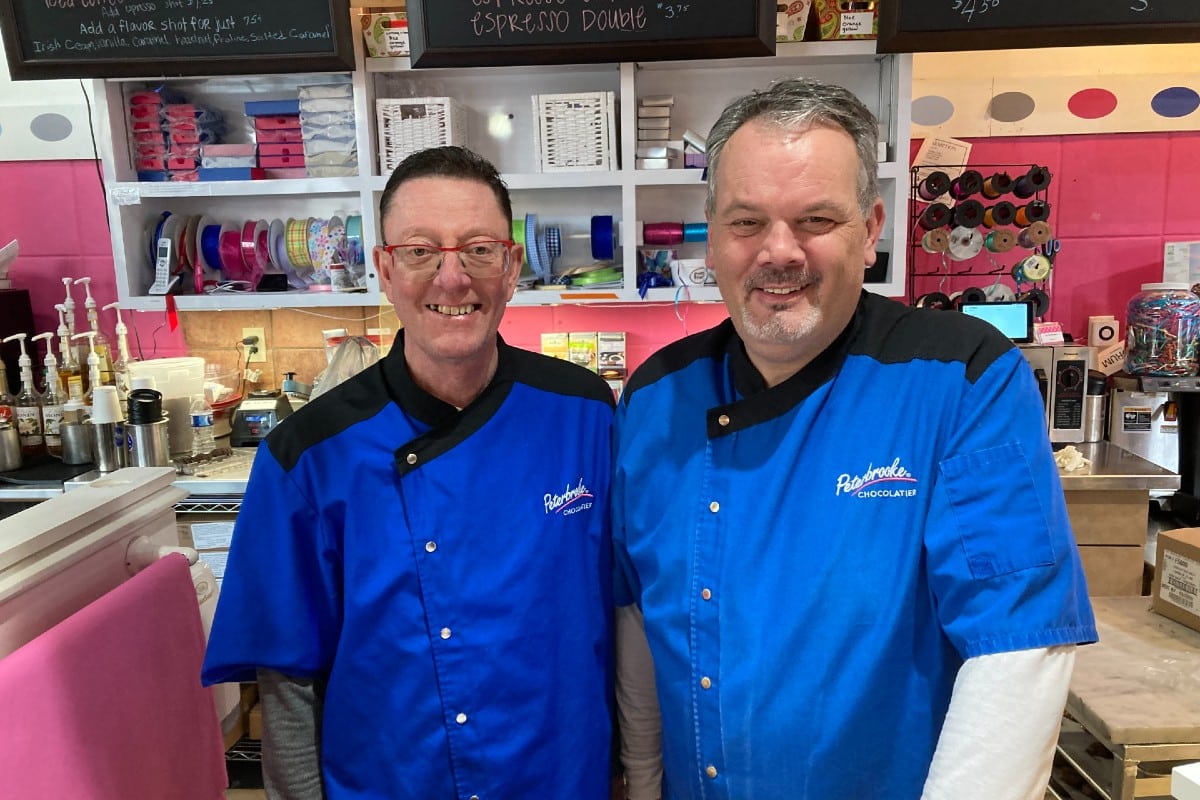
Peachtree Corners will soon lose one of its most iconic, popular and tasty businesses.
Peterbrooke Chocolatier, run by Geoffrey Wilson and Scott Gottuso, has been told by Peachtree Forum landlords, North American Properties and Nuveen Real Estate, that its lease will not be renewed. The last day of business will be July 25.
Meanwhile, Peachtree Forum is getting several new stores. They include Kendra Scott, Sucre, and The NOW Massage. Previously announced were Alloy Personal Training, Cookie Fix, Gallery Anderson Smith, Giulia, Lovesac, Nando’s Peri-Peri and Stretchlab. Wilson adds: “We are not in their big picture.”
Wilson has operated Peterbrooke at the Peachtree Forum for 14 years and Gottuso has been there nine years. They have made the chocolatier profitable and doubled sales. Wilson says: “We turned it around through community involvement and made relationships. We worked with the schools, gave donations, did a lot in the community, and made a difference. We produce most everything we sell in the shop, so it’s labor intensive. We make European-style chocolate treats from scratch from the very best ingredients, package it, make gift baskets, and also sell a lot of gelato.”
Key items include truffles, hand-made caramels, cherry cordials, chocolate-covered cookies and pretzels and strawberries hand-dipped in their own blend of chocolates. (They are all good!) One of Wilson’s and Gottuso’s most iconic products is chocolate popcorn. Once you try it, regular popcorn is tasteless. “We sell a lot of it.” Wilson adds: “Gelato sales have carried us in the summertime, since there are not many chocolate holidays in the summer.”
Peterbrooke now has five employees, and would like to have 10, but it is difficult to hire people with the skills in chocolatiering. A key part of its business is corporate companies, such as Delta Air Lines and Capital Insight. The Peachtree Corners’ Peterbrooke has corporate customers as far away as Cleveland, Ohio.
The operators were surprised when the Forum owners did not renew its five year lease. “The big decisions were made in Charlotte or Cincinnati, not locally,” Wilson feels. “We were no longer in their big picture. They want new and glitzy, shiny, fancy and trendy.”
The operators plan to start their own chocolate company, to be called “Scoffrey,” and initially sell online, plus have pop-up locations during holidays, and possibly have a booth in other merchants’ stores on occasions.
“Whatever we do would look different. We might rent a space somewhere close by so that people can still have the good chocolate experience with us, but we won’t have a regular audience walking by.”
Another element: the price of chocolate futures has spiked this year, with a bad crop production year. Wilson says: “That is key to our business and a huge cost increase. That doesn’t help.”
Wilson adds that the forced closing of the Peterbrooke location “is something like the death of a friend. But you go to the funeral and to the wake, and in six months or a year, It won’t be so bad.”
Have a comment? Send to: elliott@elliottbrack
Written by Elliott Brack
This material is presented with permission from Elliott Brack’s GwinnettForum, an online site published Tuesdays and Fridays. To become better informed about Gwinnett, subscribe (at no cost) at GwinnettForum
Related
Business
North American Properties Revitalizes Avenue East Cobb
Published
2 weeks agoon
April 16, 2024
North American Properties (NAP) has revamped the Avenue East Cobb shopping center in Marietta, boosting its appeal to suburban residents seeking a more urban lifestyle. Now, it’s being honored as part of the Atlanta Business Chronicle‘s “Best in Atlanta Real Estate” coverage.
NAP is known for transforming properties like Atlantic Station, Colony Square and The Forum.
According to the Atlanta Business Chronicle, the redevelopment involved demolishing part of the main building to build a public plaza with a stage surrounded by restaurant patios.
A new concierge facility was also added, including a canopy for drop-offs. Additionally, smaller retail buildings were created for standalone tenants. The business mix was updated to include names like Warby Parker, Lululemon and Peach State Pizza.
NAP also increased community engagement by partnering with at least 10 local organizations for social events. These efforts have proven successful. Over the last two years, Avenue East Cobb has seen a 36% increase in sales per square foot thanks to a major rise in foot traffic.
More news from North American Properties can be found here.
Related
Read the Digital Edition
Subscribe
Keep Up With Peachtree Corners News
Join our mailing list to receive the latest news and updates from our team.
You have Successfully Subscribed!

Exploring Israeli Innovation in the Smart City Sector with Einav Gabbay [Podcast]

BRACK: Peachtree Corners to lose Peterbrooke Chocolatier

Georgia United Methodist Foundation Announces Changes to Finance Team

North American Properties Revitalizes Avenue East Cobb

Spring Voting Will Determine Important Gwinnett School Board Elections

Kendra Scott Opens New Store At The Forum

Local Non-profit Boy With a Ball Announces Dates for Upcoming Conference

What’s in Store for The Forum Peachtree Corners for 2024

What’s in Store for The Forum Peachtree Corners for 2024

Kendra Scott Opens New Store At The Forum

Local Non-profit Boy With a Ball Announces Dates for Upcoming Conference

Spring Voting Will Determine Important Gwinnett School Board Elections

BRACK: Peachtree Corners to lose Peterbrooke Chocolatier

Georgia United Methodist Foundation Announces Changes to Finance Team

North American Properties Revitalizes Avenue East Cobb

Exploring Israeli Innovation in the Smart City Sector with Einav Gabbay [Podcast]

Light up the Corners [Video]

Capitalist Sage: Business Leadership in Your Community [Podcast]

Cliff Bramble: A Culinary Adventure through Italy

Top 10 Brunch Places in Gwinnett County

A Hunger for Hospitality

THE CORNERS EPISODE 3 – BLAXICAN PART 1

Top 10 Indoor Things To Do This Winter

The ED Hour: What it takes to Remove Barriers from Education
Peachtree Corners Life
Topics and Categories
Trending
-
Business1 week ago
BRACK: Peachtree Corners to lose Peterbrooke Chocolatier
-
Education5 days ago
Spring Voting Will Determine Important Gwinnett School Board Elections
-
Business2 days ago
Kendra Scott Opens New Store At The Forum
-
Doing Good4 days ago
Local Non-profit Boy With a Ball Announces Dates for Upcoming Conference









